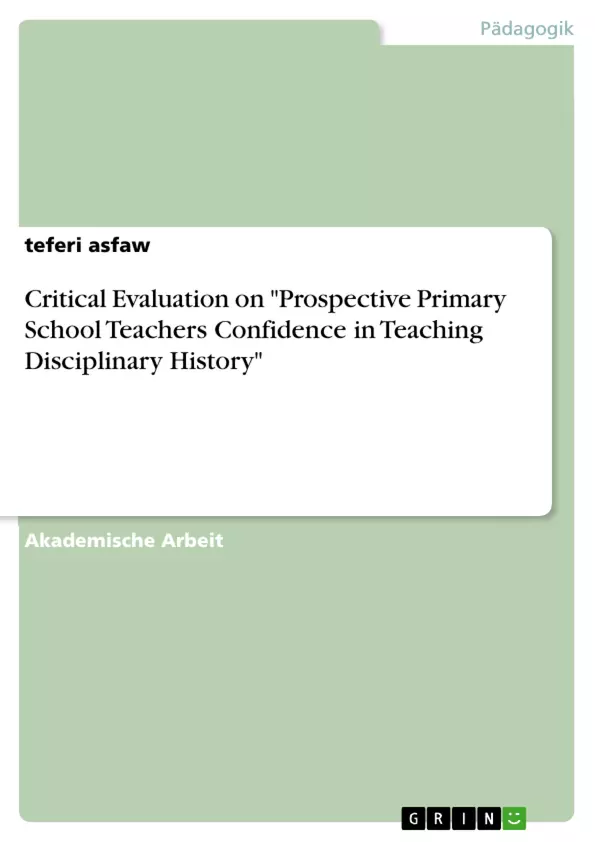The title of the article is "Prospective Primary School Teachers' Confidence in Teaching Disciplinary History." This
article was written in Finland in 2021 by Rantala, J and Khawaja, A. Professor Rantala has published articles on history education, and history curriculum. Khawaja is currently a PhD student and has published some articles.
In the main body of research the authors described since the 1990s across Europe, a new discipline called disciplinary history teaching (whose focal point is historical knowledge and the way it has been constructed) emerged. This resulted in most European countries putting emphasis on adopting disciplinary history teaching in their national curriculum. Also, Finland's National Core Curriculum calls attention to the new emerging science of historical thinking, which is disciplinary history teaching adopted in the same period. On defining the research problem authors stated, due to a shortage of time in teaching and learning, most teachers failed to make good use of disciplinary history teaching in the classroom, in similar way in-service history teacher education in Finland is challenged by inconsistency and a non-organized way of training disciplinary history teaching. In order to fill this gap, both authors require practical
implementation of disciplinary history teaching. They totally decided to use 121 trainers of primary history teachers, particularly first and second years, who took the history didactics course at Helsinki University. Researchers choose 20 student-teachers for in-depth interviews and 8 students for post-interviews from a total of 121 student-teachers. The primary objective of the article is to assess new trainers of primary school history teachers 'confidence in teaching
disciplinary history.
Inhaltsverzeichnis
- Introduction
- Summarize Research questions, Methods, Results and Discussions
- Personal response to, how it applies, why you choose and limitations or Questions to the article
Zielsetzung und Themenschwerpunkte
Dieser Artikel befasst sich mit dem Selbstvertrauen von angehenden Grundschullehrern in der Lehre von disziplinärer Geschichte. Er analysiert die Faktoren, die dieses Selbstvertrauen beeinflussen, und die Herausforderungen, die sich aus der Implementierung disziplinärer Geschichtslehre ergeben.
- Das Selbstvertrauen von angehende Grundschullehrern in der Lehre von disziplinärer Geschichte.
- Die Herausforderungen, die sich aus der Implementierung disziplinärer Geschichtslehre ergeben.
- Die Bedeutung von methodenbasierter Geschichtslehre für den Unterricht an Grundschulen.
- Die Rolle der Lehrerbildung und Fortbildung in der Förderung von disziplinärer Geschichtslehre.
- Die Auswirkungen von disziplinärer Geschichtslehre auf die Einstellungen und Problemlösungsfähigkeiten von Schülern.
Zusammenfassung der Kapitel
Das Einführungskapitel stellt den Hintergrund der disziplinären Geschichtslehre dar, die sich im Laufe der Zeit zu einem zentralen Element des Geschichtsunterrichts in Europa entwickelt hat. Es werden die Herausforderungen aufgezeigt, denen sich Lehrkräfte im Hinblick auf die Implementierung dieser Lehrmethode gegenüberstehen, insbesondere die Zeitknappheit im Unterricht und die mangelnde Organisation der Lehrerbildung.
Das zweite Kapitel fasst die Forschungsfragen, Methoden, Ergebnisse und Diskussionen des Artikels zusammen. Es werden die Datenerhebungsmethoden, die Analysetechniken und die wichtigsten Ergebnisse der Studie präsentiert. Die Autoren stellen fest, dass viele Lehrkräfte eher auf das Vermitteln von Faktenwissen fokussieren, anstatt auf die Vermittlung von Fähigkeiten.
Schlüsselwörter
Die Schlüsselwörter des Artikels sind: disziplinäre Geschichtslehre, Selbstvertrauen, Geschichtsunterricht, Lehrerbildung, Fortbildung, Fähigkeiten, Faktenwissen, Problemlösung, Einstellungen, Forschungsmethoden, qualitative Forschung, Grounded Theory, Finland.
Häufig gestellte Fragen
Was versteht man unter disziplinärer Geschichtslehre?
Dabei liegt der Fokus nicht nur auf historischen Fakten, sondern darauf, wie historisches Wissen konstruiert wird (historisches Denken).
Warum haben angehende Lehrer oft wenig Selbstvertrauen in diesem Fach?
Gründe sind oft Zeitmangel in der Ausbildung, eine mangelnde Organisation der Lehrerbildung und eine zu starke Fokussierung auf reines Faktenwissen statt auf Methoden.
Welche Studie liegt diesem Artikel zugrunde?
Es wurden 121 angehende Grundschullehrer der Universität Helsinki untersucht, ergänzt durch Tiefeninterviews mit ausgewählten Studenten.
Wie beeinflusst disziplinäre Geschichtslehre die Schüler?
Sie fördert die Problemlösungsfähigkeiten und hilft Schülern, eine kritischere Einstellung gegenüber historischen Informationen zu entwickeln.
Was ist das Hauptproblem der Geschichtslehrerbildung in Finnland?
Die Ausbildung wird oft als inkonsistent und nicht ausreichend organisiert beschrieben, was die praktische Umsetzung im Klassenzimmer erschwert.
- Citation du texte
- teferi asfaw (Auteur), Critical Evaluation on "Prospective Primary School Teachers Confidence in Teaching Disciplinary History", Munich, GRIN Verlag, https://www.grin.com/document/1271516



